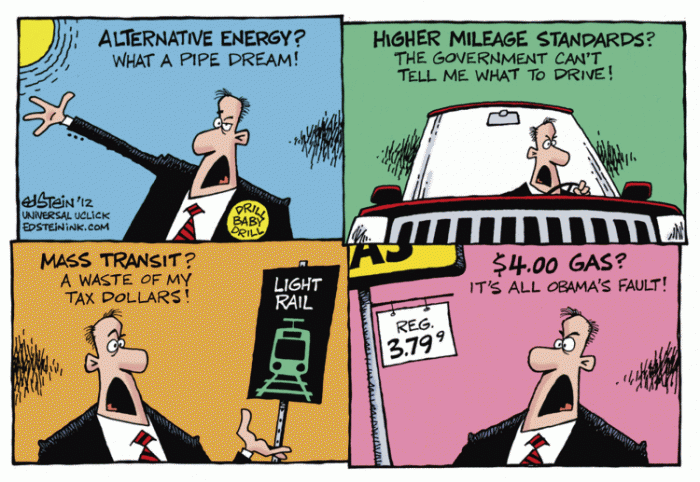Predictably, Republicans are blaming Obama for high gas prices, while Democrats are saying there is little Obama can do. I’m of two minds on this. On one hand, high prices for gasoline seems to be the only thing that can get Americans to shake our dependence on foreign oil. On the other hand, there is no actual shortage of oil (yet) and demand is actually down. So it looks like rising prices are due to our old nemesis speculation.
And there is something our government could do about that — limit the amount of oil for which a single trader can hold contracts to 5%, instead of the current 25%. Allowing a single speculator to hold contracts on 25% of the total supply of oil is ridiculous. Senator Bill Nelson predicted last year that such a limit “is so high that it would encourage speculation and make markets more volatile.” Well, duh.
One way to harness the energy of anger over oil prices is to let our representatives know that we want to put limits on speculative trading, which currently makes up half of all oil trades. Research has shown that a quarter of the price of oil is due to speculation. But with politicians dependent on super PACs who are funded by large donations from Wall Street, it is no surprise that oil prices are going up. Unless we make our voices heard over the din of corporate money, they will only continue to go up.



6 Comments
but as soon as Obama proposes we make those changes and put in those limits Republicans will call him a Socialist for trying to restrict the free market and kill any legislation before it sees the light of day, and then blame him for doing nothing.
I agree IK. Matter of fact we have enough surplus in this country that we are now exporting oil and gas. I guess that also negates the need for a pipeline since we’d just export it, although if we said we were going to approve pipelines and open drilling it would send the market in a tailspin and whack the speculators at least short term. I do think we should look at restricting the export of US oil. Treat it more like US produced electricity and or our currency. We have our own market for our domestic oil and disallow speculation. That also borders on state owned resources but perhaps there could be some compromise. Or even a tariff on exported US oil and gas that makes it more expensive then the non-domestics, so we keep it here and stabilize our energy market.
Dan – every incumbant faces the higher gas price attack. Obama himself blamed Bush during his campaign for higher prices in gas.
While I agree that speculation, on the whole, drives prices higher, I am not convinced that it is drastically different than the norm right now. Specifically, there are a couple of points from that article that make no sense:
First, the article claims, “Historically, financial speculators accounted for about 30 percent of oil trading in commodity markets, while producers and end users made up about 70 percent. Today it’s almost the reverse.” So if we have the price at $105 a barrel, speculation should contribute $73.50 (70%) of that price while the true market price is $31.50 (30%). And yet, the article just claimed that the market-driven price is $75 a barrel! That means speculation has changed the balance from its historical balance of 70/30 to 71/29, which means there is less speculation than normal. The numbers just don’t add up to support the claim.
Second, “U.S. [emph. added] demand for oil and refined products — including gasoline — is down sharply from last year.” The market price is not based on U.S. demand alone. A true and fair assessment must consider aggregate demand, which includes demand from China and other developing countries. Furthermore, supply is often perceived supply, rather than actual supply. So, even though, supply has not changed (yet), the perception that there may be a shortage resulting from Israel bombing Iran will affect the supply curve. That seems like speculation, as it is based on the future, but it is not. It is market-driven speculation, if you will.
I’m not arguing that speculation isn’t a problem and it’s not contributing to the current prices. Frankly, I don’t know because I haven’t looked into any of the numbers. However, I am arguing that the article linked to above fails to prove the thesis that speculation is driving prices right now. In fact, it seems they actually proved that current speculation is not any different than normal.
Michael, I agree with your second point, although “perceived” supply is somewhat related to speculation.
But your first point is confusing to me. Just because speculators account for 70% of oil trades in no way implies that they are responsible for 70% of the price. In fact, if speculators were responsible for 100% of the trades, then most likely the price would collapse. Speculation drives price volatility.
Ah, mea culpa. I see what the problem with my first point was. I didn’t pay close enough attention when reading and interpreted “30 percent of oil trading” to be “30 percent of the price of oil.” I thought they were arguing something completely different than what they did. My bad…